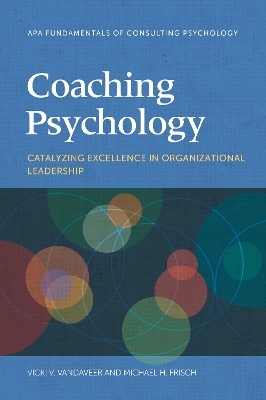
Coaching Psychology
American Psychological Association (Verlag)
978-1-4338-4007-4 (ISBN)
Coaching Psychology brings evidence-based methods and models to the practice of leadership coaching for professional and personal growth. The authors apply these tools with the aim of developing and improving the skills clients need to assume and/or be more effective in leadership positions in organizations.
This concise guide offers psychologists a comprehensive overview of coaching psychology, from initial client contact to the conclusion of the engagement. It describes the assortment of tools coaching psychologists use, including models to guide the process; didactic exercises and other homework that requires self-reflection, video clips, journaling, and assessment inventories; and key stakeholder feedback for identifying the individual’s great strengths (their platform for achieving their best Leader self) and suggested areas for improvement.
As the authors describe, the primary tool for facilitating learning is the coach’s self. Results of research on the effectiveness of various coaching methods are presented, along with practical discussions of how psychologists can acquire the often subtle skills required to become effective coaching psychologists. Common ethical dilemmas, such as how to handle multiple relationships, are examined, along with evidence-based strategies for addressing professional issues, such as maintaining emotional resilience.
Vicki V. Vandaveer, PhD, is an independent management consulting and coaching psychologist based in Houston, TX. A Fellow in American Psychological Association, Society of Consulting Psychology, Society of Industrial-Organizational (I-O) Psychology, and International Society for Coaching Psychology, she received her Ph.D. in I-O from University of Houston in 1981. She helps leaders and their companies excel through effective leadership, teamwork, and adaptive organizational transformation. Her clients include large and mid-size US and international public companies, academic medical centers, professional services firms, and professional associations. She is a frequent keynote speaker and workshop leader on coaching psychology in international professional conferences. Michael H. Frisch, PhD, is a consulting psychologist who has traveled from traditional Industrial/Organizational psychology (PhD Rice University) and its application to human resources processes (PepsiCo) to assessment and executive coaching (PDI) and finally to coach training and case supervision (iCoachNewYork). While he had many years of practice as a coach in a wide range of organizational contexts, his more recent focus is on supporting the growth and development of organizationally sponsored coaches, both internal and external. He has spoken and published on these topics and hopes that this book further normalizes the path from psychologist to professional coach.
Series Editor's Foreword
Rodney L. Lowman
Preface
Acknowledgments
Introduction
1. Coaching Psychology: Individualized Leader Development
2. A Closer Look: The Coaching Psychology Engagement
3. Coaching Psychology Tools, Methods, Techniques
4. How Effective Is Executive Coaching?
5. How Psychologists Can Prepare for Coaching Leaders
6. Ethical and Professional Issues in Coaching Psychology
Epilogue
References
Index
About the Authors
| Erscheinungsdatum | 16.08.2022 |
|---|---|
| Reihe/Serie | Fundamentals of Consulting Psychology Series |
| Verlagsort | Washington DC |
| Sprache | englisch |
| Maße | 152 x 229 mm |
| Themenwelt | Geisteswissenschaften ► Psychologie ► Arbeits- und Organisationspsychologie |
| Sozialwissenschaften ► Pädagogik ► Berufspädagogik | |
| Wirtschaft ► Betriebswirtschaft / Management ► Personalwesen | |
| Wirtschaft ► Betriebswirtschaft / Management ► Unternehmensführung / Management | |
| ISBN-10 | 1-4338-4007-3 / 1433840073 |
| ISBN-13 | 978-1-4338-4007-4 / 9781433840074 |
| Zustand | Neuware |
| Informationen gemäß Produktsicherheitsverordnung (GPSR) | |
| Haben Sie eine Frage zum Produkt? |
aus dem Bereich


